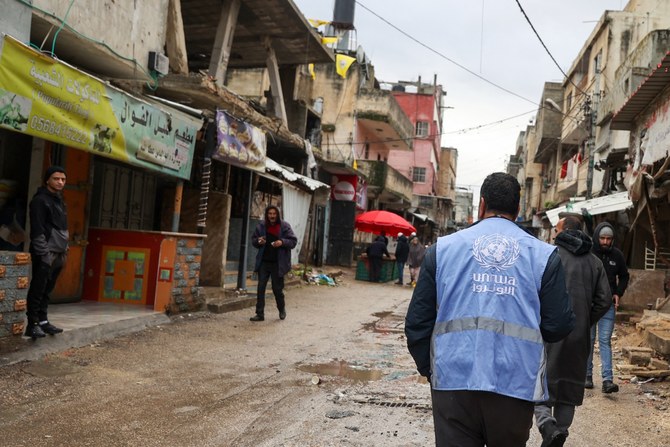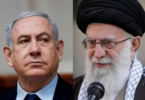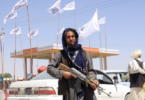Yossi Mekelberg
In times of war, the tactic of deflecting from your own wrongdoings by highlighting others’ shortcomings is as old as conflict itself. During the last week, Israel’s PR machine has been focused on the organization that has, for the last 75 years, been in charge of providing humanitarian aid to Palestinian refugees residing in the Middle East.
Israel’s anger in the face of the expose that 12 UN Relief and Works Agency employees were directly involved in the Oct. 7 Hamas massacre is understandable and justified. To say that there has not been a more embarrassing and damaging revelation in this organization’s history would be stating the very obvious. But the call to defund UNRWA, and the support for this call voiced by some governments, is a knee-jerk reaction that amounts to a betrayal of the many Palestinian victims of both the current and previous wars in their time of most desperate need.
Had Israel’s out-of-control assaults against UNRWA begun with the revelation that some of the latter’s employees were among those who carried out Hamas’ Oct. 7 terrorist attack, or in its aftermath helped to hide the hostages taken, there might have been some sympathy for Israel’s lashing out. However, the current situation comes on the back of years of venomous accusations, many of them baseless.
The organization has been attacked for its very existence, for allegedly being in cahoots with terrorists, for perpetuating the Palestinian refugee tragedy, for being corrupt, for not being good value for its funders and for being generally anti-Israeli. It has been made a scapegoat for the political failure – for which Israel is largely responsible – to bring about an end to the Israeli-Palestinian conflict, including a satisfactory solution to the plight and legal status of the refugees.
Nothing can excuse the participation of any UN employee in an act of terrorism and, in this case, the response from UNRWA’s leadership has been entirely correct. Commissioner General Philippe Lazzarini immediately announced: “To protect the agency’s ability to deliver humanitarian assistance, I have taken the decision to immediately terminate the contracts of these staff members and launch an investigation in order to establish the truth without delay.”
This is what should be expected of the organization, although its response was based on information given by the Israelis and before the completion of its own internal investigation. But for both moral and practical reasons, I can only imagine the shock and dismay of both those in charge of UNRWA and across the UN system at the news of the involvement of a number of its people in the Oct. 7 attack.
The immediate calculated hysterics demonstrated by Israeli spokespersons in calling for the defunding of UNRWA, given Israel’s long-held hostility to the agency, was only to be expected. But Israel appears confused about who exactly it is fighting in Gaza: Is it Hamas or is it those humanitarian workers who risk their lives in doing their very best to provide shelter, medical help, food, water and, yes, some dignity for those who were already refugees and now have been displaced once more by this horrific war?
Let us also for a moment allow some figures to provide us with a little perspective. UNRWA employs about 13,000 Palestinians in Gaza, out of its 30,000-strong workforce across the region. Most of them are refugees. According to Israeli intelligence’s own dossier, 190 of them are Hamas or Palestinian Islamic Jihad operatives and 1,200 have “links” to these organizations. The latter could mean anything (or absolutely nothing), such as one or more family members or friends possibly being members of these groups, which on its own is no reason not to employ them.
If the Israeli dossier is accurate, they represent a tiny proportion of UNRWA’s workforce. This issue needs to be addressed, certainly, but it is hardly a reason for nine countries, including the US, the UK and Canada, to pause their funding to the agency at the worst possible time for the Gazan people.
Neither Israel nor those who have decided to stop funding UNRWA have mentioned that 152 of its humanitarian workers have already been killed during this war or that many of them are among the 1.7 million other Gazan people displaced, which amounts to more than three-quarters of the population. Some of the displaced have been forced to move several times as a result of Israel’s relentless bombardments and ground attacks and, despite constantly running out of capacity, UNRWA’s facilities and aid remain their only hope.
Behind the severity of Israel’s accusations against a few of the agency’s people is hidden a much broader agenda, one which is the real source of so much Israeli venom aimed at UNRWA. Israel would like to see the refugee issue just disappear into thin air. The very existence of UNRWA is an inconvenient reminder of the issue of Palestinian refugees and of Israel’s role in creating it in the first place – and for leaving it unresolved ever since.
The people of Gaza will remain in Gaza after the war ends, whether Israel recognizes them or not. Many more are now refugees and further displaced. There is an international responsibility to protect them and provide them with humanitarian aid.
Israel’s call to defund UNRWA is one of the longest-running bluffs in its policies toward the Palestinians. Because were UNRWA to be dismantled, it is Israel, as the occupying country, that would be responsible for the refugees’ well-being, at least in the West Bank and Gaza. And if they are deprived of medical services, education, financial help and shelter, the anger will be first and foremost directed at Israel, and not without justification.
Moreover, the demise of UNRWA would mean the loss of thousands of jobs for refugees, with all the implications attached to such a development, let alone the fact that those are the people likely to become the very backbone of a future independent Palestinian state. And in other host countries, the defunding of UNRWA will only serve as a further destabilizing factor in a region already on the brink of widespread armed conflict.
The need for UNRWA to discipline those among them who have brought the organization into disrepute is indisputable. However, to punish the entire agency – and thus the recipients of its humanitarian services – is immoral and immensely damaging. It will only condemn millions of innocent people to more misery and suffering, which cannot be justified. And for those who want UNRWA to disappear, here is your challenge: please come up with a viable alternative that does not compromise the well-being of millions of refugees and their just aspiration for self-determination living side by side with Israel.
Arab News







